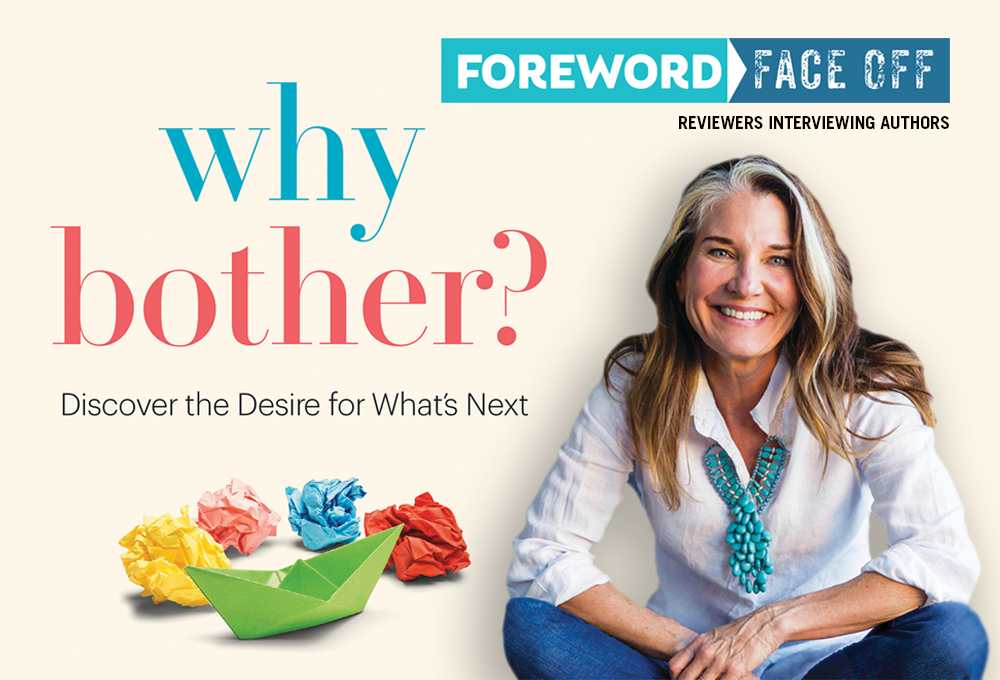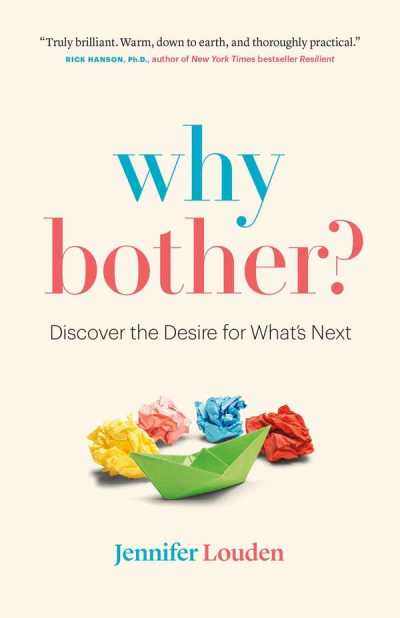Reviewer Melissa Wuske interviews Jennifer Loudon, author of Why Bother?: Discover the Desire for What's Next

The last few months have been a nightmare—COVID-19, the near collapse of the US economy, multiple killings of unarmed black citizens by aggressive police officers, tear gas used against peaceful protesters in ninety-six cities around the country, bitter political division, and the drip, drip, drip of worsening climate data.
Something’s gotta give. If you’re not bummed out and stressed, you must be some kind of yogi master.
But please don’t succumb to all the gloom. Life has so much more in store for you. Let’s hear from someone who can help us all move past this temporary state of despair.

Meet Jennifer Louden, one of the pioneers of self-care based on The Woman’s Comfort Book, the first of her eight books on personal well-being. Melissa Wuske reviewed her latest project, Why Bother?, for the May/June issue of Foreword, and noted that it cuts through “common excuses for staying stuck in fear and unwanted situations … [and] makes room for continual self-forgiveness and exhibits grace in saying that it takes time to change. It is inviting and honest, and its real-life examples suggest that people can transform their lives for the better.”
Recognizing that Jennifer is the perfect messenger for these troubled times, we reached out to Page Two for help in setting up this inspiring conversation. Melissa, take it from here.
It’s easy to see the negative side of the virus crisis, but how do you see this as an opportunity to grow, heal, or shift toward something long desired?
Whenever something is interrupted or taken from us, we have an opportunity to ask, “What do I really want now?”
Many of us have been forced into changes that we didn’t want, and lots of us are naturally grieving, disappointed, and angry. I had to cancel my book tour, two retreats, our family reunion to celebrate my bonus son’s college graduation, as well as a long-planned trip down the Grand Canyon with friends. My income plummeted and I was terrified my new book, eleven years in the making, would disappear without a trace in the pandemic insanity.
At first, I was depressed, napping often and eating a lot of toast. The opportunity arrived when I let go of what was and started asking, “I wonder what I want now, and what I can create now, given this new world?” It won’t be the same, It doesn’t mean my sadness and anger go “poof,” but it does mean I don’t forfeit the present because I’m stuck in what should have been.
Leaving behind isn’t a “one and done” or easy; it’s more of a practice that we circle around and keep experimenting with.
The book mostly focuses on individual situations and losses. How can this approach work in more collective situations—families facing loss, workplaces facing devastating cuts, and, most timely, societies facing a “new normal?”
You could use the “why bother?” process with a family, a company, a working group, a non-profit, or any group where you all share goals and there is a certain level of trust. Start by taking stock: where does each person feel there is no reason to bother, no point, no possibility for change or improvement? We get stuck in the grubby bummer side of “why bother?” and default to resignation and resentment because we assume, often without realizing it, that the status quo can never change. How many times can we look at history and a bunch of people said, “Nope, can’t happen, lost cause,” and someone came along and said, “Why not?”
Of course, some things may well be pointless or impossible and that, in itself, is valuable, even crucial information, and too often organizations and institutions won’t acknowledge this reality.
What suggestions do you have for people who are facing intense personal struggles on top of today’s much more far-reaching traumas?
Don’t take it personally. We all fall into “why bother?” when we don’t get the support we need. Did you know people who have better home insurance, for one example, recover emotionally faster after a natural disaster than homeowners with an insurance company that fights them every step of the way? When you have decent health insurance, a safe place to live, good social support, a job that doesn’t demean you or place you in danger, you can handle a black swan event like the pandemic much, much better.
That might sound depressing because many of us don’t have all this, but I find it liberating because then I don’t blame myself for things that are societal. This frees me to focus on what is within my ability to change, and what isn’t, and also to concentrate my activism on issues that enrage me, so my anger doesn’t eat me alive.
For many this global pandemic and the lifestyle changes that have come with it is a time to “take stock”—a step you advise on the road to bothering. What are some practical tools people can use?
I’ve been asking people to keep a running log of what they love more about their lives now and what they don’t miss. People are reporting all kinds of epiphanies. One woman who lives with her widowed father realized that when life goes back to “normal,” and she’s commuting two hours a day again, she doesn’t have to “freak out about hurrying home to make dad dinner—he actually can cook too.” Another reader told me she’s fallen in love with her “side hustle” of teaching voice to adults and wants to slowly expand this to be her business. A group of audiologists I spoke to discovered they could make time for themselves if they allowed it; which sounds so obvious, but for many of these caregivers, it’s been almost impossible to take care of themselves until now because it had been so long since they experienced balance and self-care.
Here’s a couple of journaling prompts I’ve been using with students:
Has the pandemic brought gifts, changes, ways of seeing I want to share and remember?
If this is a Great Reset, what Reset do I want?
You ask an intriguing question: “how might going after what you savor now allow you to serve later?” How do times like this help, rather than hinder, people redefine what it means to savor and serve?
All of our lives have changed, suddenly and forcibly. We’ve all had the opportunity, if we’re willing and brave enough to pay attention, to notice what we don’t miss, what wasn’t working, and what we are so very glad we don’t have to do anymore.
What ways of serving were we engaging in pre-pandemic that drained our energy? What was too much? Where, if anywhere, had we defaulted into thinking it was all up to us, or if it wasn’t done by us it wouldn’t be done correctly?
I’ve observed people serving in new ways, especially virtual volunteering. I wonder if it feels a bit less daunting to get involved with causes you care about if you can do it from home? I know I enjoy texting people to get out of the vote, for example, more than calling or knocking on doors. Perhaps more people will find ways to serve that fit their lives.
People are responding to the stress of this time in a lot of different ways. What choices do you see lots of people making now that are setting them back? What choices, however small, are setting people up to thrive well into the future?
Judging ourselves harshly for not writing a novel, cleaning out the basement, organizing all the photos, getting in touch with everybody we have ever known, and mastering Mandarin will set us back. Judging ourselves for getting testy and exhausted as the pandemic drags on will set us back. Not asking for help with the extra duties we may have at home with homeschooling, cooking, and cleaning will set us back.
The choices that set us up to thrive are honestly the entire process of my new book, especially the quote, “Every act of self-harshness stops the flow of life and creativity that brings you to what’s next.” I also wish everyone would give themselves a desire retreat where, for a period of time, you only do exactly what you want. Even an hour can be restorative.
You have an intense, determined optimism. Can you share a message of hope, particularly for librarians (our readers) who are living with drastic changes in the present and are facing an uncertain future for their livelihoods?
I feel for anyone who loves their work and can’t serve during the pandemic. It’s like not being able to fully use your heart. That’s exhausting because you feel powerless.
You don’t want to fight these emotions or the truth that life has changed. Fighting and denying reality is also exhausting, and often sets us up to believe we have more control than we do.
It’s very helpful to spend some time every day reminding yourself you are safe and you are a resourceful person who has always managed to handle what life brings—not perfectly, but well enough. We humans hate uncertainty, which makes soothing our brains with reminders we are okay, safe, and have resources very important; as does creating routines and rituals that give us a measure of predictability.
You may also find it helpful to spend time remembering the spark of your calling to be a librarian. My guess is there is something bigger and more enduring that brought you to the work that is always with you even when you aren’t working. Nobody can ever take that from you, and remembering that and feeling that can remind you that no matter the future, you will express yourself in ways that bring you alive and serve ideas, serve people, serve books.
Melissa Wuske
